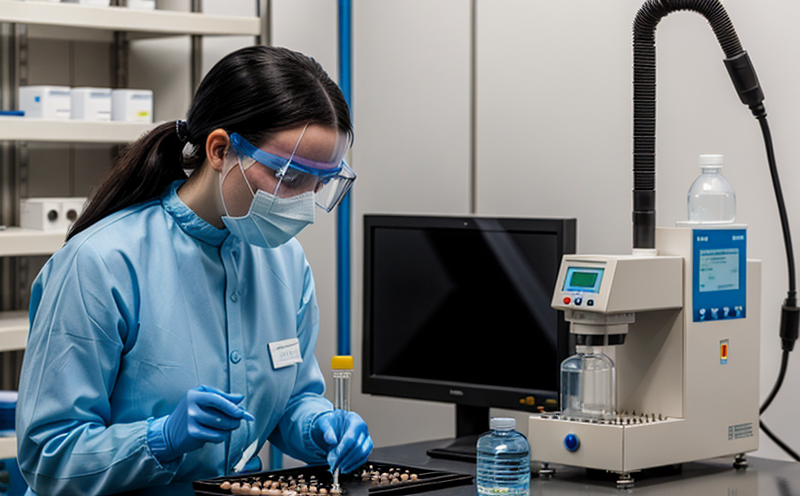Manganese Impurity Profiling Testing
Identifying and quantifying manganese impurities is crucial in pharmaceutical manufacturing. Manganese can be introduced into drug substances during various stages of production, from raw material procurement to final formulation. Understanding the presence, form, and concentration of manganese impurities is essential for ensuring product quality, safety, and regulatory compliance.
The testing process involves several critical steps. First, a representative sample of the pharmaceutical substance must be prepared, taking into account potential contamination points throughout the supply chain. This preparation can include dissolution methods tailored to the specific drug form (e.g., tablets, capsules, or injectables). Once prepared, the sample undergoes thorough analysis using advanced analytical techniques such as Inductively Coupled Plasma Mass Spectrometry (ICP-MS) and High Performance Liquid Chromatography with Diode Array Detection (HPLC-DAD).
These methods allow for precise quantification of manganese impurities at levels that are both regulatory compliant and clinically significant. Regulatory bodies like the United States Food and Drug Administration (FDA), European Medicines Agency (EMA), and International Conference on Harmonization (ICH) provide specific guidelines regarding acceptable limits of trace metals in pharmaceutical products.
The importance of this testing cannot be overstated, especially given recent incidents involving metal contamination in drug products. For instance, the recall of certain batches of valsartan due to nitrosamine impurities underscored the need for robust quality control measures including thorough manganese profiling.
Our laboratory adheres strictly to these guidelines and uses only the most sophisticated equipment available to ensure accurate results. The testing process is not just about identifying the presence of manganese; it's also about understanding its form (e.g., Mn(II), Mn(III)) and potential impact on the drug’s stability, efficacy, and safety.
Our team of experienced scientists and engineers works closely with clients to tailor each test plan specifically for their product. From initial sample submission through final report generation, we provide comprehensive support every step of the way. This approach ensures that our clients receive reliable data they can trust—data that informs critical decisions about process improvements or necessary recalls.
By leveraging cutting-edge technology and adhering to stringent protocols, Eurolab delivers accurate, reproducible results for manganese impurity profiling. Our commitment to excellence makes us a leader in pharmaceutical testing services worldwide.
Applied Standards
| Standard | Description |
|---|---|
| USP | Method for Determining Heavy Metals in Drugs. |
| ICH Q3D(R1) | Guideline on Elemental Impurities. |
| Pharmacopoeia of the People's Republic of China (2020 Edition), Volume IV, Chapter 0821 | Methods for Determining Trace Elements in Pharmaceuticals. |
Eurolab Advantages
At Eurolab, we pride ourselves on providing comprehensive pharmaceutical testing solutions tailored specifically to meet the needs of our clients. Our state-of-the-art facilities and highly skilled team ensure that every test is conducted with precision and care.
- Advanced Analytical Capabilities: Utilizing ICP-MS, HPLC-DAD, and other leading-edge technologies allows us to deliver precise results even when dealing with minute quantities of manganese impurities.
- Comprehensive Reporting: We provide detailed reports that include not only the quantitative data but also interpretive insights into what these findings mean for your product's quality and safety.
- Regulatory Compliance: Ensuring full adherence to international standards like USP, ICH Q3D(R1), and Chinese Pharmacopoeia guarantees that our clients' products meet all necessary regulatory requirements.
- Client Collaboration: From initial consultation through final report delivery, we work closely with each client to understand their unique challenges and goals. This collaborative approach ensures that the testing process aligns perfectly with your specific needs.
In summary, Eurolab's expertise in manganese impurity profiling testing provides unparalleled reliability and accuracy. Whether you're conducting routine quality checks or investigating a suspected contamination issue, our services are designed to give you peace of mind knowing that your product is safe and compliant.
Why Choose This Test
- Manganese impurity profiling helps ensure drug safety by detecting potentially harmful levels early in the production process.
- The test provides critical information about the form of manganese present, which can influence its toxicity and stability within formulations.
- Regulatory compliance is assured through adherence to established standards such as USP , ICH Q3D(R1), and Chinese Pharmacopoeia.
- Data generated from this testing process supports informed decision-making regarding manufacturing processes, formulation adjustments, and potential recalls.
- The use of advanced analytical techniques ensures that even trace amounts of manganese are detected accurately.
- Our experienced team offers expert guidance throughout the entire testing process, ensuring seamless integration into your quality assurance protocols.
In conclusion, choosing Eurolab for manganese impurity profiling means selecting a partner committed to excellence in pharmaceutical testing. We leverage our extensive experience and cutting-edge technology to provide you with reliable, actionable data that drives informed decision-making and enhances product safety.





